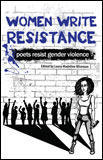November 5, 2013WOMEN WRITE RESISTANCE: POETS RESIST GENDER VIOLENCE
Review by Jeffrey Hecker
Hyacinth Girl Press
ISBN-10: 0615772781
ISBN-13: 978-0615772783
2012, 252 pp., $19.95
hyacinthgirlpress.com
Kaiser Wilson, have you forgotten your sympathy with the poor Germans because they were not self-governed? 20,000,000 American women are not self-governed. Take the beam out of your own eye.
—Silent Sentinel banner, 1918, directed at President Woodrow WilsonEvery male has a stake in feminism. Obviously it is not a good situation for anybody when one sex has earned the greater right to complain. And don’t happy women tend to be generous? Self-interest, if not basic decency, should convince men that a fair-minded feminism is also their liberation. All of us, finally, free enough to be scoundrels.
—Stephen Dunn, Journal Notes, Walking Light, 2001
Good news: August 18th marked the 93rd anniversary of 19th Amendment ratification.
Bad news: Mike Wallace (60 Minutes) was 93 years old when he expired last year.
Good news: 2020 will mark a single century American since women legally cast ballots in every town and city, increasing the popular vote count in Warren Harding’s election by 8.3 million. Another way to consider that: there are less breathing bodies in all of Switzerland as I’m writing. Bad news: I wish I was flying to Switzerland instead of Norfolk, Virginia.
More bad news: it’s 2013—and many Y chromosomes strut around our United States like they personally invented the blast furnace (invented in Sweden circa 1350, probably by a nice bookish child). The nightmare goes beyond endless, baseless boasting. Despite impressive barriers broken by women in just Mike Wallace’s life span, men continue to beat, victimize, and psychologically manipulate, all while audaciously claiming to love their babies. Here’s good news: I can’t put down Women Write Resistance: Poets Resist Gender Violence, an anthology of 106 writers alive, fighting tormentors with a carry-on item no TSA agent can ever take away: VERSE.
Editor Laura Madeline Wiseman conducts a choir of multi-cultural voices Adrienne Rich would be proud to call soul sisters. The collection includes pages laying out Wiseman’s intent (pyromania, a.k.a. open dialogue), as well as pages of critical background. Her introduction sets a necessary fire, especially for the faint-hearted. These poems are projected more toward those fearful to speak than those empowered, which is why I believe this book is vital to the mute and the Muse.
The pieces run a wide tonal spectrum, from nuptial violation (Ann Bracken’s “Marital Privilege”); workplace human resources hypocrisy (Marianne Kunkel’s “In Praise of a Co-Worker); all strains of verbal, physical, emotional abuses (Laure-Anne Bosselaar “The Cellar”); and rape brutality (Natanya Ann Pulley “High-Water Mark”); to poems exposing subliminal neglect; witnesses to barbarism (Lisa Lewis “Tracy And Joe”); understated acts of liberation (Sandi Day “I Wanted To Tell You The Dog Died”); experimentation (Evie Shockley “At The Musée De L’Homme”); satire (Monica Wendel “Sexual Assault Awareness Week”); and an innovative form of feng shui break-up letter (Kristin Abraham “from Caution: Avoid Getting in Eyes or For External Use Only”).
These poets, Audible Sentinels, continue a path blazed by Silent Sentinels, who were not silent, who changed the meaning of that word, who paced in front of the White House over two years in bad weather without police protection, who only ceased marching after they’d gained access to a ballot box, even knowing their only two choices would be rich white men brandishing suspect smiles. This book sports its own Facebook page you can join. Contributors reading pieces from this ensemble can also be found on YouTube. This is essential historical work I expect to see cross-stitched into classroom, bathrooms, living and dining rooms. In 2016, I hope women and clear-headed men vote in a woman president. A single strophe from Lois Marie Harrod’s “Off” sets the mood, a mood that refuses to set the table nor do dishes. In fairness, this anthology wipes the table clear off satellite imagery:
I’m off too, she said. Outtahere—off, if
he comes home oiled again. Get off of
me, she said, I mean if a man is going
to act like that, I’m gone, away, off the
shelf, absentee, off before you off me
off like a sock, you’re off your rocker,
you know that? Off your nut. Off
your trolley, call 911.